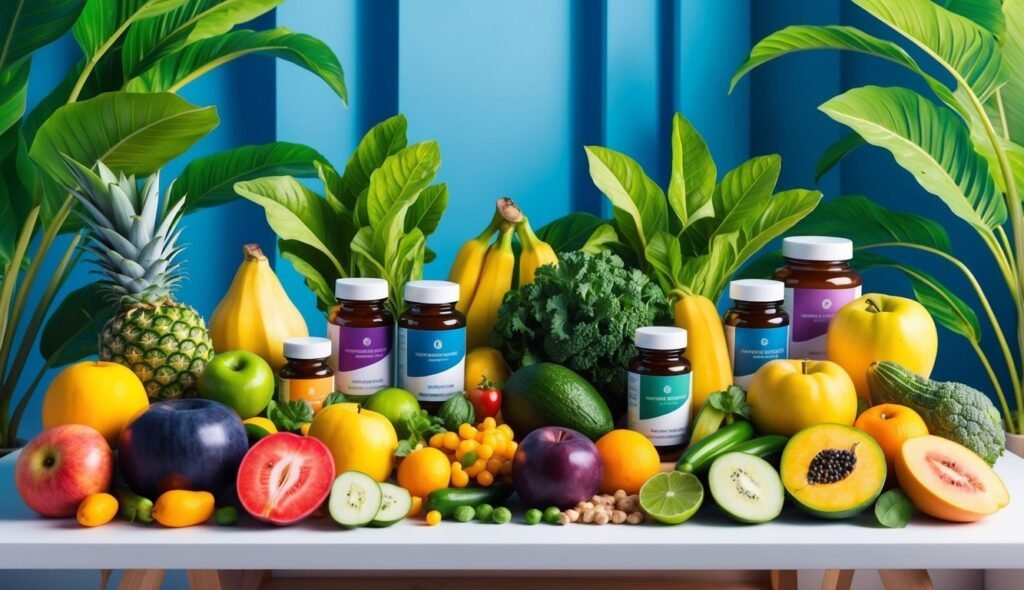I’ve been on a journey to find the best ways to keep inflammation in check, and it’s been quite the eye-opener.
Inflammation can affect our overall well-being, so it’s essential to explore effective options that can help manage it. In this article, I’ll share some of the top supplements and foods that have shown promise in reducing inflammation.
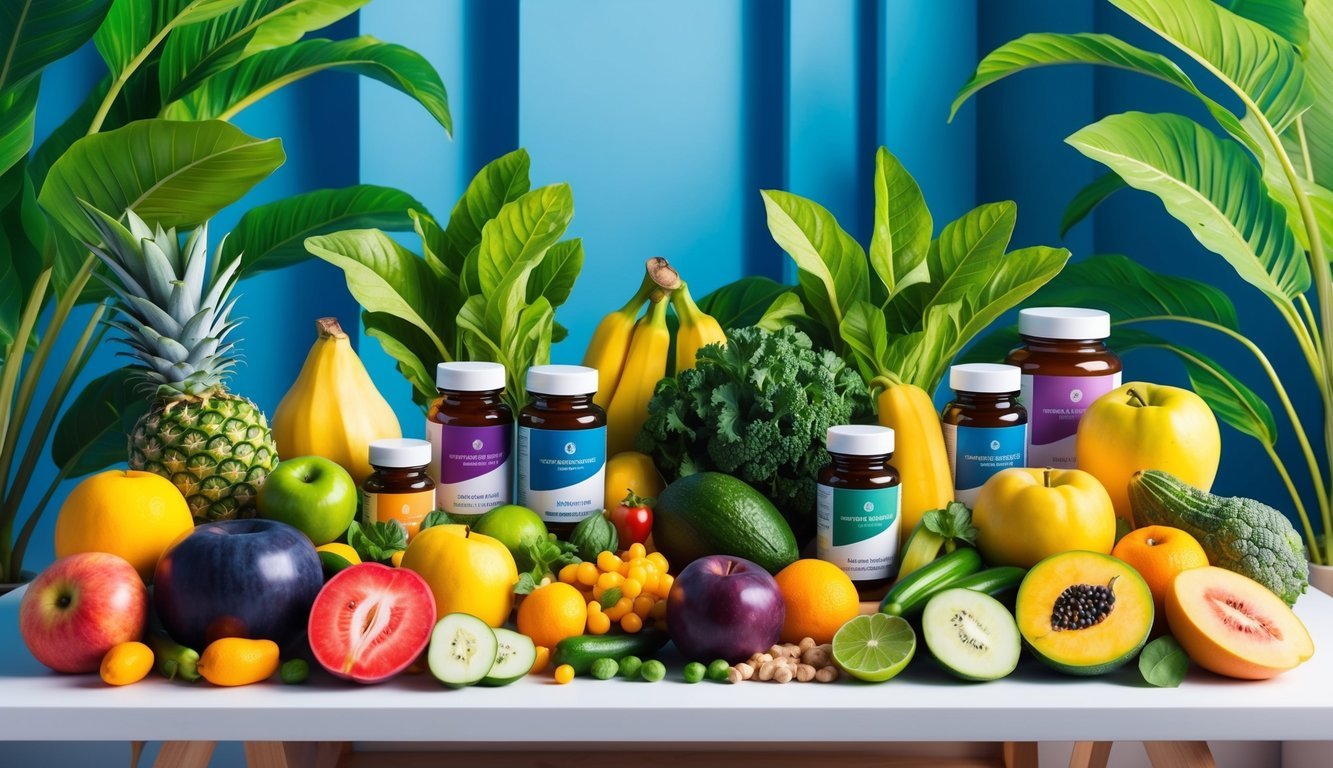
From natural compounds to delicious foods, there’s a lot out there to consider.
I’ve found that incorporating certain ingredients into my diet not only makes meals tasty but also offers potential health benefits.
By focusing on these key supplements and foods, we can support our bodies in staying healthy and vibrant.
1) Turmeric Curcumin Supplements
I’ve found that turmeric curcumin supplements are popular for their potential anti-inflammatory benefits.
Curcumin is the active compound in turmeric, and it’s much more concentrated in supplement form than in the spice itself.
When I look for a quality supplement, I pay attention to the dosage.
Many options offer a high dose of curcumin, which can be beneficial for targeting inflammation.
Some of my favorites are from brands like Nature Made and Sports Research.
They produce effective formulations that have received positive reviews for their quality.
It’s also worth noting that curcumin is better absorbed when combined with black pepper, which boosts its effectiveness.
Look for supplements that include this combination for the best results.
I appreciate the convenience of capsules since they make it easy to incorporate into my routine.
Just remember to check with a healthcare professional, especially if you’re taking other medications.
2) Ginger Root Tea
I love starting my day with a warm cup of ginger root tea.
It has a unique, spicy flavor that not only wakes me up but also offers some impressive health benefits.
Ginger contains natural compounds known for their anti-inflammatory properties.
When I drink ginger tea, I feel good knowing it may help reduce inflammation in my body.
This is especially helpful after a workout or on days when I feel a bit off.
It’s also great for digestion.
Ginger can aid in moving food through the digestive tract, which means I often feel lighter after enjoying a cup.
Plus, it’s known to help with nausea, whether it’s from morning sickness or simply overindulging the night before.
Making ginger tea is simple.
I typically steep fresh ginger slices in hot water for about 10 minutes.
Adding a bit of lemon or honey enhances the flavor and boosts its health benefits.
This tea is definitely a staple in my routine for keeping inflammation in check.
3) Omega-3 Fish Oil Capsules
I find Omega-3 fish oil capsules to be a solid choice for tackling inflammation.
They contain essential fatty acids, particularly EPA and DHA, which have been linked to reduced inflammation in the body.
I often look for high-quality capsules that provide a good amount of EPA and DHA per serving.
Brands like Nordic Naturals and Carlson are often recommended for their purity and potency.
What I appreciate about fish oil capsules is their convenience.
They’re easy to take and don’t have the fishy taste that some liquid oils do.
This makes it simpler for me to incorporate them into my daily routine.
If I’m looking for a vegan option, there are also algae-based Omega-3 supplements available.
These provide a plant-based source of DHA and EPA.
Keeping Omega-3s in my diet, whether through capsules or fatty fish, has been beneficial for my overall wellness journey, especially when it comes to managing inflammation.
4) Matcha Green Tea Powder
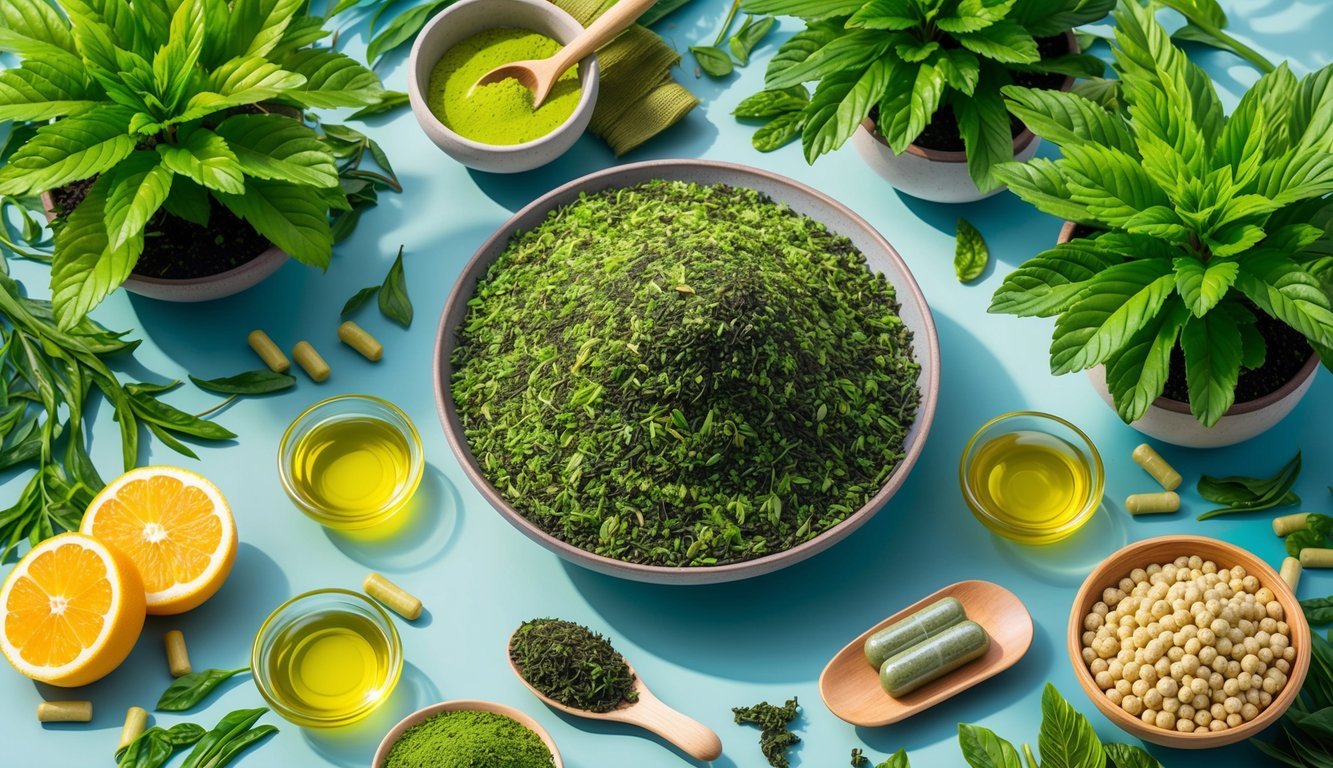
Matcha green tea powder is a unique contender in the fight against inflammation.
I appreciate its antioxidant properties, particularly from catechins like EGCG, which help neutralize free radicals in my body.
The process of making matcha is enjoyable, too.
I simply whisk half to two teaspoons of matcha powder with hot water until smooth.
It creates a calming drink that feels both traditional and refreshing.
What I love about matcha is its versatility.
I can enjoy it hot or mix it into lattes with my favorite milk.
The amino acid L-theanine also contributes to its anti-inflammatory effects, making it a well-rounded addition to my diet.
Incorporating matcha into my daily routine has become a delicious ritual.
It not only helps manage inflammation but also boosts my energy and focus throughout the day.
Whether alone or in recipes, matcha is a great choice for anyone looking to support their health.
5) Bone Broth Protein
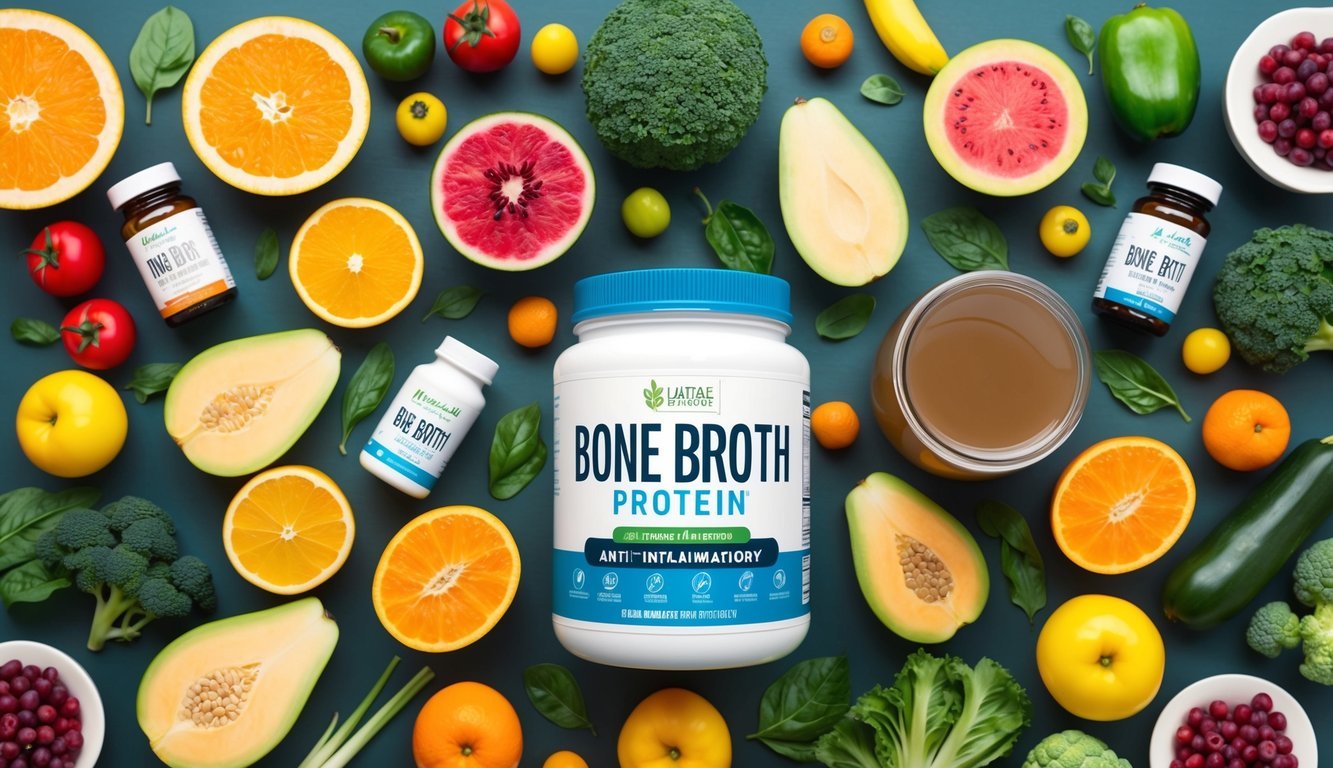
I’ve discovered that bone broth protein is quite the hidden gem for fighting inflammation.
Made by simmering bones and connective tissue, it’s packed with nutrients that support my body.
What I love about bone broth is its rich content of amino acids, especially glycine.
This amino acid has been linked to reducing inflammation and improving gut health, which is something I always aim for.
I often opt for bone broth protein powders or ready-made broths.
They’re convenient and easy to add to my diet, whether in soups or smoothies.
Some popular options include paleo-inspired blends that are grass-fed, offering quality proteins without unnecessary additives.
These choices fit perfectly into my health routine, making it simple to incorporate the goodness of bone broth into my meals.
Overall, adding bone broth protein has been a delicious way to support my body in fighting inflammation.
6) Chia Seeds
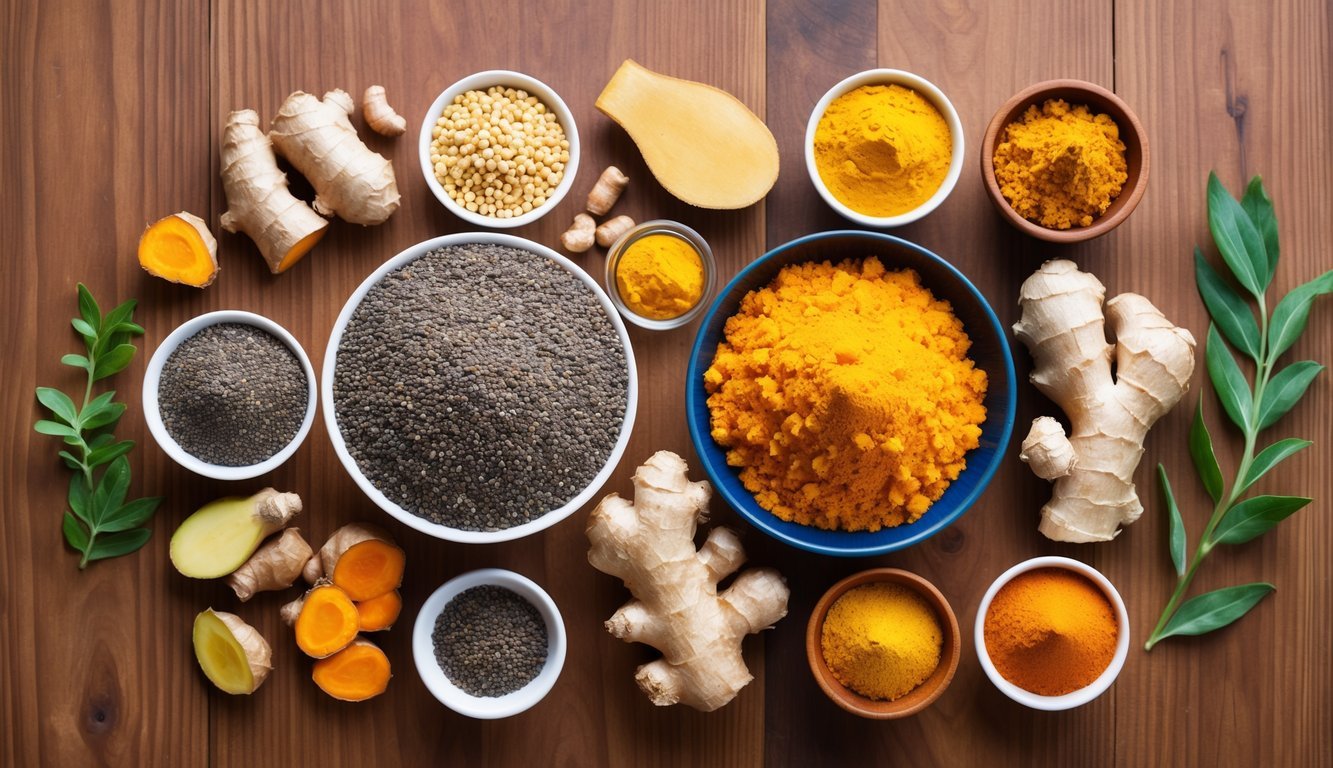
I love incorporating chia seeds into my diet.
These tiny seeds are not only versatile but also packed with nutrients that can help reduce inflammation.
Chia seeds are rich in omega-3 fatty acids, which are known for their anti-inflammatory properties.
Just two tablespoons can deliver a significant amount of these healthy fats along with protein and fiber.
The fiber content in chia seeds is impressive.
One ounce provides about 10 grams, which can support digestive health and contribute to overall wellness.
I often add chia seeds to smoothies, yogurt, or even oatmeal.
They absorb liquid and create a gel-like texture, which can make my meals feel more satisfying.
Regularly consuming chia seeds may also help lower cholesterol and blood pressure, which are important factors in managing inflammation.
For me, they’re an easy addition to a healthy diet.
7) Pineapple Bromelain Enzyme

I find the bromelain enzyme from pineapple to be quite fascinating.
This enzyme is extracted from both the fruit and the stem of the pineapple plant.
It’s known for its protein-digesting capabilities.
One of the benefits I’ve noticed is its potential to reduce inflammation.
Many people, including myself, appreciate bromelain for its ability to help with swelling and muscle soreness after workouts or injuries.
It’s not just about inflammation; bromelain may also support digestion.
I sometimes enjoy fresh pineapple to aid my digestive health.
The natural fiber and antioxidants in the fruit can help protect my cells, too.
If I’m looking for a concentrated source, supplements like those combining bromelain with other anti-inflammatory ingredients, such as quercetin, can be very effective.
I’ve read that they can provide additional benefits for joint and muscle health.
Incorporating pineapple or bromelain supplements into my routine has been a simple and tasty way to support my overall wellness.
8) Tart Cherry Juice

Tart cherry juice has caught my attention for its potential to help reduce inflammation.
It’s packed with beneficial compounds like flavonoids and anthocyanins, which are known for their anti-inflammatory properties.
I’ve learned that drinking tart cherry juice can lower certain biomarkers associated with chronic inflammation.
It feels good knowing there’s research suggesting it can aid in conditions linked to inflammation.
Additionally, I appreciate that tart cherries are high in potassium, which supports heart health.
Some studies have even shown that daily consumption might help lower blood pressure.
When I choose tart cherry juice, I make sure to look for options without added sugars.
This keeps my intake balanced, considering that cherries naturally contain sugar.
I find about 8 ounces a day is considered a reasonable serving size.
It works well as part of a balanced diet to help manage inflammation.
For a refreshing twist, I sometimes combine it with sparkling water or add it to smoothies.
It’s an easy way to incorporate this juice into my routine while enjoying its benefits.
Understanding Inflammation

Inflammation is a natural response by the body to protect itself from harm.
It can become chronic, leading to various health issues.
I want to explore what causes inflammation and the symptoms that signal its presence.
Causes of Inflammation
Various factors can trigger inflammation in the body.
Common causes include:
- Infections: Bacterial, viral, or fungal infections can prompt an inflammatory response.
- Injury: Physical trauma, such as a sprain, leads to inflammation as the body tries to heal.
- Chronic diseases: Conditions like diabetes, heart disease, and obesity can result in ongoing inflammation.
- Environmental factors: Pollution, toxins, and allergens can irritate the body.
- Diet: High sugar, unhealthy fats, and processed foods may promote inflammation.
Understanding these triggers helps in avoiding situations that may lead to chronic inflammation.
Symptoms to Look Out For
Recognizing the signs of inflammation is crucial for prompt action.
Key symptoms include:
- Redness and swelling: Affected areas may appear red and feel swollen due to increased blood flow.
- Pain: Inflammation often causes discomfort, ranging from mild to severe.
- Heat: Inflamed areas may feel warm to the touch.
- Loss of function: Depending on the site, inflammation can limit movement or function in joints and muscles.
Being aware of these symptoms enables me to seek help if I notice them, ensuring timely management of inflammation.
The Role of Diet in Managing Inflammation
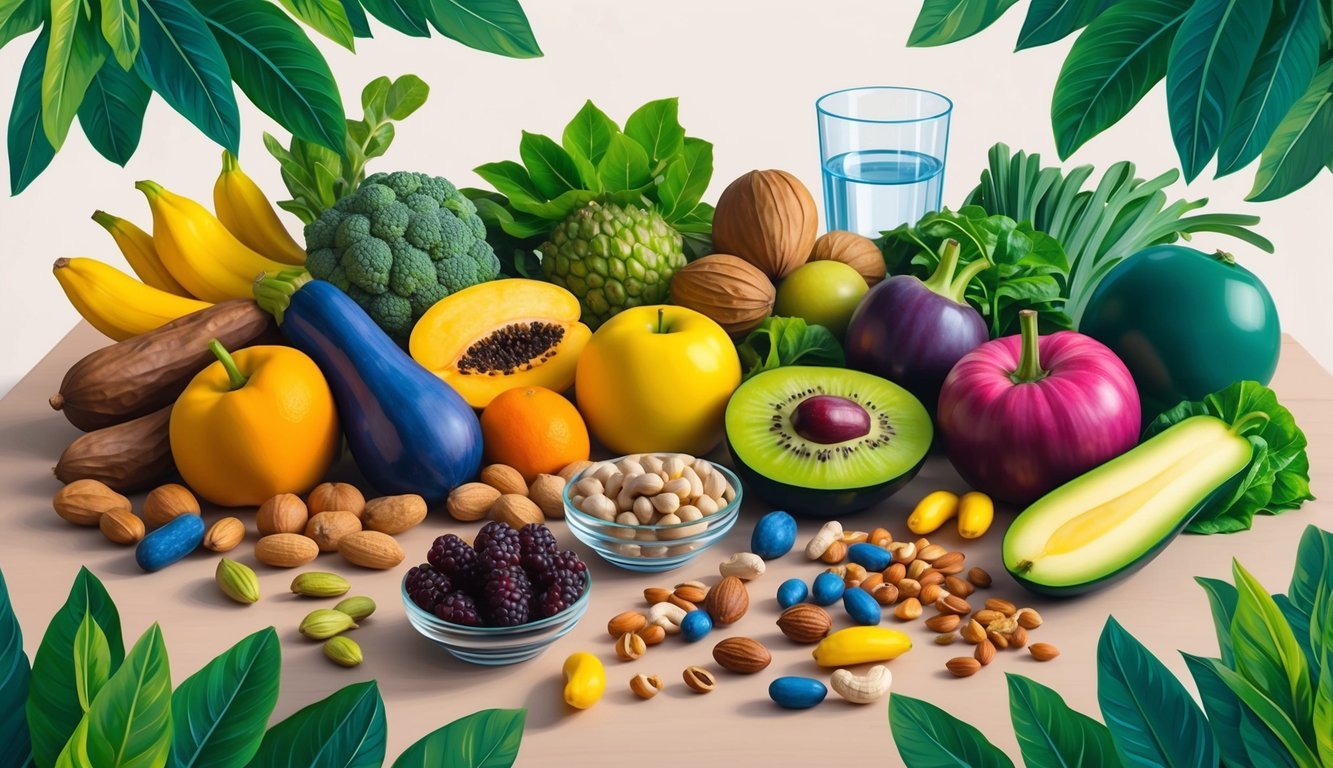
I’ve learned that diet plays a crucial role in managing inflammation.
The right foods can either contribute to inflammation or help mitigate it.
Understanding the impact of processed versus whole foods can guide better dietary choices.
Impact of Processed Foods
Processed foods often contain additives, preservatives, and unhealthy fats, which can trigger inflammation in the body.
Ingredients like refined sugars and certain oils contribute to increased inflammatory markers.
For instance, foods like white bread, sugary snacks, and fast food can lead to weight gain and inflammation.
Key culprits include:
- Sugary beverages: They are high in fructose and can promote inflammation.
- Refined carbohydrates: Foods like white bread and pastries can spike blood sugar levels.
- Processed meats: They contain nitrates and other chemicals linked to higher levels of inflammation.
Reducing these foods in my diet can significantly lower inflammation levels and support overall health.
Whole Foods and Their Benefits
Incorporating whole foods into my diet can make a big difference in managing inflammation.
Foods that are rich in antioxidants, vitamins, and healthy fats can help combat inflammatory processes.
Some beneficial options are:
- Fatty fish: Such as salmon and mackerel, which are high in omega-3 fatty acids.
- Fruits and vegetables: Berries, spinach, and kale are powerhouses of antioxidants.
- Nuts and seeds: Almonds and chia seeds provide healthy fats and nutrients.
Eating a variety of these foods not only helps lower inflammation but also promotes better overall health.
By focusing on whole foods, I’m making a positive impact on my well-being and inflammation management.
In addition to a nutritious diet, incorporating the best supplements for senior immunity can further support overall health and strengthen the body’s defense system.
Nutrients like vitamin C, vitamin D, and zinc play a crucial role in maintaining immunity and reducing inflammation.
By combining whole foods with the right supplements, I can enhance my well-being and promote long-term health.

